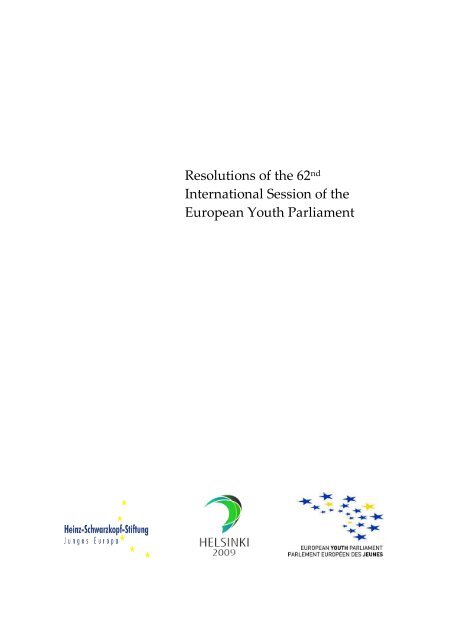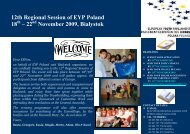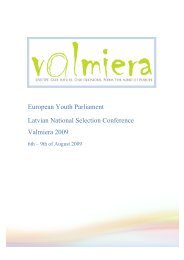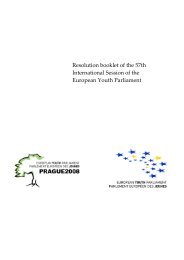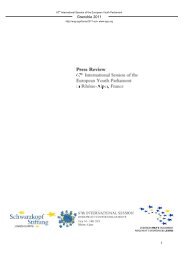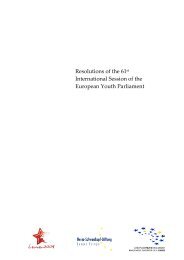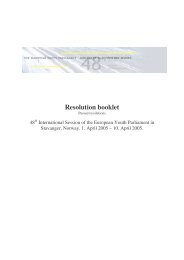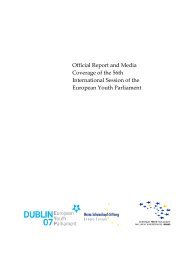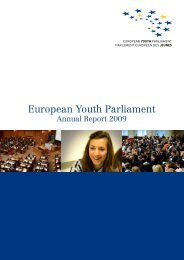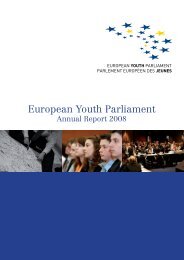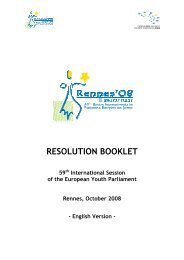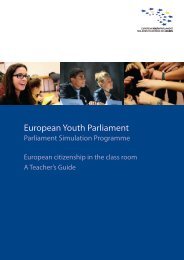Resolutions booklet in English - European Youth Parliament
Resolutions booklet in English - European Youth Parliament
Resolutions booklet in English - European Youth Parliament
You also want an ePaper? Increase the reach of your titles
YUMPU automatically turns print PDFs into web optimized ePapers that Google loves.
<strong>Resolutions</strong> of the 62 nd<br />
International Session of the<br />
<strong>European</strong> <strong>Youth</strong> <strong>Parliament</strong>
Under the High Patronage of<br />
Mr. Sauli Ni<strong>in</strong>istö, Mr. Alexander Stubb and Mr. Stefan Wall<strong>in</strong><br />
RESOLUTION BOOKLET<br />
62 nd International Session of the <strong>European</strong><br />
<strong>Youth</strong> <strong>Parliament</strong><br />
23 rd October – 1 st November, 2009
RESOLUTIONS PASSED BY THE 62 ND INTERNATIONAL<br />
SESSION OF THE EUROPEAN YOUTH PARLIAMENT<br />
- INCLUDED IN THIS BOOKLET -<br />
Resolution by the Committee on Transport and Tourism<br />
Resolution by the Committee on Legal Affairs<br />
Resolution by the Committee on Environment, Public Health and<br />
Food Safety I<br />
Resolution by the Committee on Environment, Public Health and<br />
Food Safety II<br />
Resolution by the Committee on Constitutional Affairs<br />
Resolution by the Committee on Foreign Affairs I<br />
Resolution by the Committee on Foreign Affairs II<br />
Resolution by the Committee on Industry, Research and Energy<br />
Resolution by the Committee on Internal Market and Consumer Protection I<br />
Resolution by the Committee on Internal Market and Consumer Protection II<br />
Resolution by the Committee on Economic and Monetary Affairs<br />
Resolution by the Committee on Climate Change<br />
Resolution by the Committee on Culture and Education<br />
FAILED RESOLUTIONS AT THE 62 ND INTERNATIONAL<br />
SESSION OF THE EUROPEAN YOUTH PARLIAMENT<br />
Resolution by the Committee on Civil Liberties, Justice and Home Affairs I<br />
Resolution by the Committee on Civil Liberties, Justice and Home Affairs II
Hels<strong>in</strong>ki, October - November 2009<br />
MOTION FOR A RESOLUTION BY THE COMMITTEE ON<br />
TRANSPORT AND TOURISM<br />
With global shipp<strong>in</strong>g routes under <strong>in</strong>creas<strong>in</strong>g threat from armed pirates: how<br />
should the EU respond to this threat to global security and <strong>in</strong>ternational trade<br />
stability?<br />
Submitted by: Robert Caldwell (IE), Viktor Dahmberg (SE), Lydia Drews (DE), Pedro Félix<br />
(PT), Jean-Louis Gakusi (FR), Dmytro Honcharenko (UA), Richard Janousek<br />
(CZ), Ida Klippenvåg (NO), Dionysios Pelekis (GR), Marjuska Pennanen (FI),<br />
Milan Petit (NL), Jonathan Piepers (BE), Mar<strong>in</strong>a Pokrovskaya (RU), Oliver<br />
Todd (GB), Ieva Vīksne (LV), Robert Torvela<strong>in</strong>en (Chairperson, FI)<br />
The <strong>European</strong> <strong>Youth</strong> <strong>Parliament</strong>,<br />
A. Deeply conscious of the major impacts of piracy <strong>in</strong>clud<strong>in</strong>g:<br />
i) the <strong>in</strong>flationary effect on consumer prices,<br />
ii) estimated revenue loss of 7 billion USD per annum,<br />
iii) political and legal disputes,<br />
iv) environmental damage,<br />
B. Fully alarmed by the high level of piracy <strong>in</strong> Somali waters,<br />
C. Deeply regrett<strong>in</strong>g that the rise of piracy <strong>in</strong> Somalia is caused by societal issues, such as:<br />
i) lack of a stable economy,<br />
ii) foreign exploitation of Somali resources,<br />
iii) absence of an effective government s<strong>in</strong>ce 1991,<br />
D. Alarmed by the <strong>in</strong>creased smuggl<strong>in</strong>g of weapons <strong>in</strong>to Somalia from Yemen and surround<strong>in</strong>g<br />
regions, thus aggregat<strong>in</strong>g the country’s situation even further,<br />
E. Realis<strong>in</strong>g that the current United Nations (UN) and <strong>European</strong> Union’s (EU) missions <strong>in</strong><br />
Somalia are necessary,<br />
F. Recognis<strong>in</strong>g the importance of naval operations among the <strong>in</strong>ternational community, such<br />
as:<br />
i) Operation Atalanta,<br />
ii) Cooperation cell NAVCO,<br />
iii) Comb<strong>in</strong>ed Task Force 150,<br />
iv) <strong>in</strong>dividual nations’ escort vessels,<br />
G. Keep<strong>in</strong>g <strong>in</strong> m<strong>in</strong>d that a large area of operations leads to an <strong>in</strong>sufficient surveillance rout<strong>in</strong>e,<br />
H. Hav<strong>in</strong>g studied the <strong>in</strong>adequacy of current legal systems to combat piracy,<br />
I. Not<strong>in</strong>g with approval the success of anti-piracy operations <strong>in</strong> the Malacca Straits,<br />
J. Emphasis<strong>in</strong>g the importance of both long and short-term strategies;
1. Strongly recommends Member States to pressure the United Nations Security Council to<br />
take concerted action aga<strong>in</strong>st piracy;<br />
2. Encourages the <strong>European</strong> Commission to subsidise the purchase of non-lethal defence<br />
systems for shipp<strong>in</strong>g and trad<strong>in</strong>g companies registered <strong>in</strong> Member States;<br />
3. Calls for <strong>in</strong>ternational forces to implement the Maritime Security Patrol Area <strong>in</strong> the Gulf of<br />
Aden as a means of better protect<strong>in</strong>g vessels;<br />
4. Supports the <strong>in</strong>crease of EU military presence <strong>in</strong> order to:<br />
a) <strong>in</strong>crease the efficiency of Operation Atalanta,<br />
b) prevent the smuggl<strong>in</strong>g of weapons <strong>in</strong>to the region,<br />
c) contribute to more extensive UN operations;<br />
5. Endorses the tra<strong>in</strong><strong>in</strong>g of Somali security forces by EU experts;<br />
6. Requests an <strong>in</strong>crease <strong>in</strong> the presence of the United Nations <strong>in</strong> order to stabilise the<br />
governance of Somalia;<br />
7. Urges the <strong>European</strong> Commission to utilise their crisis response fund, the Instrument for<br />
Stability, to f<strong>in</strong>ance a micro-loan programme <strong>in</strong> Somalia <strong>in</strong> order to stabilise the economy;<br />
8. Further <strong>in</strong>vites the International Monetary Fund to cont<strong>in</strong>ue the micro loan programme after<br />
the Instrument for Stability expires;<br />
9. Strongly recommends clarification and standardisation of <strong>in</strong>ternational law concern<strong>in</strong>g<br />
penalisation of piracy to better enable law enforcement agencies to prosecute pirates.
Hels<strong>in</strong>ki, October - November 2009<br />
MOTION FOR A RESOLUTION BY THE COMMITTEE ON<br />
LEGAL AFFAIRS<br />
With copyright <strong>in</strong>fr<strong>in</strong>gement becom<strong>in</strong>g a grow<strong>in</strong>g risk to <strong>in</strong>novation and<br />
<strong>in</strong>vestment: how could <strong>European</strong> countries regulate open source media without<br />
stifl<strong>in</strong>g competition?<br />
Submitted by: Akira Biondo (CH), Randolf Carr (DE), Carla Celda Tomás (ES), Beatrice<br />
Coclite (IT), Gareth McNamara (IE), Crist<strong>in</strong>a-Andreea Moraru (RO), Kati<br />
Pärn (EE), Mark Power Smith (GB), Ana Rita Rabaçal Dornelas das Eiras<br />
(PT), Hélène Soulier (FR), Kristian Støback Wilhelmsen (NO), Dmytro<br />
Vorobey (UA), Arriana Yiallourides (CY), Lac<strong>in</strong>a Koné (Vice-President, FR)<br />
The <strong>European</strong> <strong>Youth</strong> <strong>Parliament</strong>,<br />
A. Bear<strong>in</strong>g <strong>in</strong> m<strong>in</strong>d that many copyright laws that predate digitalisation and the current rapid<br />
technological development are no longer adequate,<br />
B. Deplor<strong>in</strong>g the widespread misuse of legitimate concepts such as peer-to-peer technology<br />
(P2P),<br />
C. Alarmed by the high accessibility of copyrighted media through the <strong>in</strong>creas<strong>in</strong>g number of<br />
pirated media sources such as P2P and fileshar<strong>in</strong>g,<br />
D. Not<strong>in</strong>g with concern that it is possible to profit from the illegal sale of copyright-protected<br />
work,<br />
E. Deeply concerned by copyright <strong>in</strong>fr<strong>in</strong>gement result<strong>in</strong>g <strong>in</strong> the decrease of profits for<br />
producers discourag<strong>in</strong>g <strong>in</strong>novation and <strong>in</strong>vestment,<br />
F. Concerned by the lack of effort to shut down websites conta<strong>in</strong><strong>in</strong>g pirated media,<br />
G. Recognis<strong>in</strong>g the need to make public the regulations concern<strong>in</strong>g copyright <strong>in</strong>fr<strong>in</strong>gement,<br />
H. Emphasis<strong>in</strong>g the need to protect <strong>in</strong>dividual privacy whenever possible,<br />
I. Fully aware of the right to privacy and access to <strong>in</strong>formation with reference to the High<br />
Authority for Diffusion of Works and Protection <strong>in</strong> the Internet (HADOPI),<br />
J. Recognis<strong>in</strong>g that consumers have a natural preference of access<strong>in</strong>g media free of charge;<br />
1. Declares piracy to consist of:<br />
a) the upload<strong>in</strong>g of protected content without the copyright holder’s permission,<br />
b) host<strong>in</strong>g these materials on personal or commercial websites,<br />
c) the download<strong>in</strong>g, redistribution and sale of pirated media,<br />
d) the download<strong>in</strong>g of significant amounts of protected content;<br />
2. Calls upon the <strong>European</strong> Commission to draft a regulation on <strong>in</strong>tellectual property deal<strong>in</strong>g<br />
with <strong>in</strong>ternet-based media;<br />
3. Calls for a clear, precise, EU-wide, multimedia <strong>in</strong>formation campaign to:<br />
a) raise awareness about the laws regulat<strong>in</strong>g copyright <strong>in</strong>fr<strong>in</strong>gements,
) illustrate the risks of illegal file shar<strong>in</strong>g or download<strong>in</strong>g such as unconsciously shar<strong>in</strong>g<br />
personal data or contract<strong>in</strong>g viruses,<br />
c) <strong>in</strong>form users about exactly which websites or programmes are often used for illegal<br />
distribution of pirate media;<br />
4. Further requests the <strong>European</strong> Audiovisual and Culture Executive Agency to be designated<br />
as a responsible entity for the implementation of a new programme aimed at:<br />
a) support<strong>in</strong>g all k<strong>in</strong>ds of media <strong>in</strong>novation,<br />
b) encourag<strong>in</strong>g creators to make their work freely accessible, available and viewable<br />
onl<strong>in</strong>e;<br />
5. Approves of systems that allow creators to determ<strong>in</strong>e the copyright conditions and prices of<br />
their own work such as creative commons;<br />
6. Deems onl<strong>in</strong>e track<strong>in</strong>g necessary <strong>in</strong> certa<strong>in</strong> cases to detect and prosecute <strong>in</strong>cidents of largescale<br />
copyright <strong>in</strong>fr<strong>in</strong>gements;<br />
7. Endorses prohibition of pirated media and content on search eng<strong>in</strong>e sites through cooperation<br />
with EU based eng<strong>in</strong>es;<br />
8. Requests multimedia websites to remove any media determ<strong>in</strong>ed to be <strong>in</strong> violation of EU<br />
copyright regulations and, if fail<strong>in</strong>g to do so, be blocked with<strong>in</strong> the EU until hav<strong>in</strong>g done so;<br />
9. Calls for the establishment of an EU watchdog agency to monitor the track<strong>in</strong>g of <strong>in</strong>dividuals<br />
suspected of piracy.
Hels<strong>in</strong>ki, October - November 2009<br />
MOTION FOR A RESOLUTION BY THE COMMITTEE ON<br />
ENVIRONMENT, PUBLIC HEALTH AND FOOD SAFETY I<br />
With access to good quality water be<strong>in</strong>g fundamental to our daily lives and to<br />
most economic activities: how can <strong>European</strong> countries meet the challenge of<br />
ma<strong>in</strong>ta<strong>in</strong><strong>in</strong>g a clean water resource <strong>in</strong> the future?<br />
Submitted by: Başak Arslan (TR), Raphael Bek (AT), Felicia Dahlquist (SE), Uchenna Egbete<br />
(UA), Sophia Elz (DE), Simona Gr<strong>in</strong>berg (RO), Janne Kirmet (EE), Ana<br />
Kurdgelashvili (GE), Maja Maletkovic (CS), Léa Oriol (FR), Julia Szkudlarek<br />
(PL), Janne Vanhemmens (BE), Katie Teahan (Chairperson, IE)<br />
The <strong>European</strong> <strong>Youth</strong> <strong>Parliament</strong>,<br />
A. Referr<strong>in</strong>g to the <strong>European</strong> Environmental Agency (EEA) as the ma<strong>in</strong> body responsible for<br />
water resources, susta<strong>in</strong>ability and consumption,<br />
B. Not<strong>in</strong>g that the EEA is comprised of the Member States of the <strong>European</strong> Union and the<br />
Neighbourhood Policy,<br />
C. Alarmed by the harmful impact waste water has on the environment from the agriculture,<br />
<strong>in</strong>dustrial, tourism and domestic sectors,<br />
D. Emphasis<strong>in</strong>g the importance of the Water Framework Directive (WFD) while also not<strong>in</strong>g<br />
that WFD health standards are lower than those of the World Health Organisation,<br />
E. Fully aware of uneven water pric<strong>in</strong>g systems across different <strong>European</strong> states,<br />
F. Not<strong>in</strong>g with concern that water use has <strong>in</strong>creased over the last two decades and has stabilised<br />
at a high level, thus mak<strong>in</strong>g a self-sufficient water supply desirable,<br />
G. Realis<strong>in</strong>g that there are low quality water systems <strong>in</strong> some parts of Europe which lead to bad<br />
sanitation and waste of water,<br />
H. Bear<strong>in</strong>g <strong>in</strong> m<strong>in</strong>d the different geographical and socio-economic conditions which exist across<br />
Europe,<br />
I. Not<strong>in</strong>g that many river bas<strong>in</strong>s have been affected by water scarcity,<br />
J. Observ<strong>in</strong>g that droughts have an immediate and significant economic, social and<br />
environmental impact,<br />
K. Deplor<strong>in</strong>g the practice of illegal water abstraction,<br />
L. Recognis<strong>in</strong>g the <strong>in</strong>creas<strong>in</strong>g necessity to collect and utilise ra<strong>in</strong>water efficiently,<br />
M. Deeply concerned by the extreme environmental hazards caused by desal<strong>in</strong>ation plants,<br />
N. Not<strong>in</strong>g the usage of water by the manufactur<strong>in</strong>g <strong>in</strong>dustries for:<br />
i) clean<strong>in</strong>g,<br />
ii) temperature management,<br />
iii) generat<strong>in</strong>g steam to transport dissolved substances or particles,<br />
iv) a resource of its own;
1. Affirms that all of the follow<strong>in</strong>g clauses will be carried out by the <strong>European</strong> Environment<br />
Agency;<br />
2. Calls for an <strong>in</strong>creased effort to detect illegal water abstraction;<br />
3. Urges exist<strong>in</strong>g Common Agricultural Policy subsidies to be directly related to the use of<br />
water recycl<strong>in</strong>g and water efficient crops;<br />
4. Calls upon the <strong>European</strong> Environmental Agency to help and advise farmers across Europe<br />
on:<br />
a) waste water recycl<strong>in</strong>g techniques,<br />
b) irrigation systems,<br />
c) efficient land use,<br />
d) energy crops;<br />
5. Calls for the creation of a media campaign to raise awareness on the importance of water<br />
preservation by educat<strong>in</strong>g citizens about:<br />
a) water quality and safety,<br />
b) use of ra<strong>in</strong>water <strong>in</strong> households and gardens,<br />
c) <strong>in</strong>creased water stress <strong>in</strong> tourist regions;<br />
6. Recommends the M<strong>in</strong>istries of Tourism of all <strong>European</strong> countries to consider efficient water<br />
management as a criteria <strong>in</strong> rat<strong>in</strong>g tourism venues;<br />
7. Recommends the use of recycled waste water as cool<strong>in</strong>g and heat<strong>in</strong>g water by the <strong>in</strong>dustrial<br />
sector;<br />
8. Requests the <strong>in</strong>troduction of an eco-label that <strong>in</strong>forms consumers that products which bear<br />
this label were manufactured us<strong>in</strong>g water efficient methods;<br />
9. Expresses its hope that countries <strong>in</strong>vest <strong>in</strong> local recycl<strong>in</strong>g bas<strong>in</strong>s for grey water from<br />
households;<br />
10. Calls upon the <strong>European</strong> Union to support the replacement of water systems through the<br />
EEA <strong>in</strong> order to prevent water leakage and to ensure high quality tap water;<br />
11. Encourages the EEA to engage <strong>in</strong> research for <strong>in</strong>novative solutions to water efficiency and<br />
water substitutes;<br />
12. Calls for the use of desal<strong>in</strong>ation plants only <strong>in</strong> areas where it is deemed essential;<br />
13. Supports the cont<strong>in</strong>uation and development of the WFD’s emergency plan;<br />
14. Strongly suggests to help countries affected by flood <strong>in</strong> order to prevent poor quality water;<br />
15. Encourages <strong>European</strong> countries to adopt stricter laws to better regulate the pollution of<br />
water;<br />
16. Requests that all countries <strong>in</strong> Europe <strong>in</strong>troduce a water payment scheme under the follow<strong>in</strong>g<br />
provisions:<br />
a) those states with an exist<strong>in</strong>g “pay as you use” system cont<strong>in</strong>ue to do so and adhere to<br />
their own provisions,<br />
b) states who charge either a flat rate charge, or no charge, impose an appropriate limit for<br />
water usage and charge a fee when this limit is exceeded.
Hels<strong>in</strong>ki, October - November 2009<br />
MOTION FOR A RESOLUTION BY<br />
THE COMMITTEE ON ENVIRONMENT, PUBLIC<br />
HEALTH AND FOOD SAFETY II<br />
A modern necessity or an unnecessary burden? To what extent should <strong>European</strong><br />
countries support recycl<strong>in</strong>g? Should <strong>European</strong> taxpayers directly subsidise private<br />
recycl<strong>in</strong>g enterprises to ensure a susta<strong>in</strong>able future for our planet?<br />
Submitted by: Aleksandar Arandjelovic (RS), Marie Brun (FR), Fanny Gassmann (CH),<br />
Milos Ilic (AT), Susannah Karatzia (CY), Deniz Kartepe (TR), Moonika Lepp<br />
(EE), Olga Petrova (UA), Sean Precht (IT), Sarah Pycarelle (BE), Clara<br />
Schröder (DE), Maria-Cristiana Teodorescu (RO), Anna Trojanowska (PL),<br />
Jukka-Matti Turtia<strong>in</strong>en (FI), Beáta Veisová (CZ), Andris Šuvajevs<br />
(Chairperson, LV), Hadrien Segond (President, DE)<br />
The <strong>European</strong> <strong>Youth</strong> <strong>Parliament</strong>,<br />
A. Tak<strong>in</strong>g <strong>in</strong>to account that recycl<strong>in</strong>g reduces employment <strong>in</strong> traditional <strong>in</strong>dustries (e.g. m<strong>in</strong><strong>in</strong>g,<br />
forestry etc.),<br />
B. Aware of the fact that natural resources are limited,<br />
C. Emphasis<strong>in</strong>g that recycl<strong>in</strong>g is a future-orientated <strong>in</strong>dustry, thus will provide employment,<br />
D. Bear<strong>in</strong>g <strong>in</strong> m<strong>in</strong>d that recycl<strong>in</strong>g is environmentally friendly and lowers the overall ecological<br />
footpr<strong>in</strong>t by:<br />
i) reduc<strong>in</strong>g Green House Gases and CO2 emissions,<br />
ii) reduc<strong>in</strong>g waste production,<br />
iii) sav<strong>in</strong>g energy,<br />
E. Recognis<strong>in</strong>g that most products are not designed with recycl<strong>in</strong>g <strong>in</strong> m<strong>in</strong>d,<br />
F. Deeply concerned that landfills are the most commonly used waste management method<br />
despite their dangerous nature,<br />
G. Acknowledg<strong>in</strong>g the <strong>European</strong> <strong>Parliament</strong>’s resolution 2006/2175 (INI) on waste recycl<strong>in</strong>g,<br />
H. Keep<strong>in</strong>g <strong>in</strong> m<strong>in</strong>d that although <strong>in</strong>c<strong>in</strong>eration is not the ‘greenest’ solution it is rapidly<br />
replac<strong>in</strong>g landfills,<br />
I. Draws attention to the fact that there is a lack of environmental awareness and responsibility<br />
amongst citizens,<br />
J. Alarmed by the fact that an <strong>in</strong>sufficient supply of recyclates <strong>in</strong> Member States leads to<br />
<strong>in</strong>efficiencies <strong>in</strong> the recycl<strong>in</strong>g system,<br />
K. Affirm<strong>in</strong>g that certa<strong>in</strong> materials such as paper cannot be recycled <strong>in</strong>def<strong>in</strong>itely,<br />
L. Aware of the f<strong>in</strong>ancial issues affect<strong>in</strong>g the field of recycl<strong>in</strong>g such as:<br />
i) lack of fund<strong>in</strong>g for new technology and <strong>in</strong>frastructure,<br />
ii) economical disparities between countries,<br />
iii) high cost of waste transportation,
M. View<strong>in</strong>g with appreciation that for a vast majority of materials recycl<strong>in</strong>g is profitable (e.g.<br />
plastic, alum<strong>in</strong>ium),<br />
N. Conscious of the differences between waste management policies <strong>in</strong> the Member States,<br />
O. Not<strong>in</strong>g with concern that some Member States are unable to comply with <strong>European</strong><br />
directives or openly ignore them, and thus face sanctions,<br />
P. Not<strong>in</strong>g with regret that a lack of transparency <strong>in</strong> some recycl<strong>in</strong>g companies causes distrust <strong>in</strong><br />
the society;<br />
1. Urges Member States to provide new job opportunities <strong>in</strong> future-orientated <strong>in</strong>dustries such<br />
as recycl<strong>in</strong>g;<br />
2. Requests Member States to offer free vocational tra<strong>in</strong><strong>in</strong>g <strong>in</strong> future-orientated <strong>in</strong>dustries,<br />
especially for people from traditional <strong>in</strong>dustries;<br />
3. Encourages Member States to <strong>in</strong>vest <strong>in</strong> research and development of susta<strong>in</strong>able design of<br />
products;<br />
4. Approves the <strong>European</strong> <strong>Parliament</strong>’s resolution 2006/2175 (INI) on bann<strong>in</strong>g landfill<strong>in</strong>g for<br />
all recyclable products;<br />
5. Welcomes <strong>in</strong>c<strong>in</strong>eration as a solution for unrecyclable waste if used with proper filter<strong>in</strong>g<br />
technology;<br />
6. Encourages Member States to use recycl<strong>in</strong>g rather than <strong>in</strong>c<strong>in</strong>eration when possible <strong>in</strong> order<br />
to be more environmentally friendly;<br />
7. Calls upon the <strong>European</strong> Environment Agency (EEA) to raise public awareness about<br />
recycl<strong>in</strong>g by means of:<br />
a) media campaigns,<br />
b) creat<strong>in</strong>g a ‘recycl<strong>in</strong>g mascot’ <strong>in</strong> order to appeal to the younger generation,<br />
c) local programmes such as competitions, demonstrations, social events,<br />
d) implement<strong>in</strong>g recycl<strong>in</strong>g <strong>in</strong> school curricula,<br />
e) <strong>in</strong>creas<strong>in</strong>g the number of recycl<strong>in</strong>g facilities <strong>in</strong> public places;<br />
8. Calls for the compulsory and consistent collection of recyclates <strong>in</strong> order to ensure an<br />
efficient recycl<strong>in</strong>g procedure;<br />
9. Trusts Member States to follow the example of Germany, Estonia etc. to <strong>in</strong>troduce<br />
“conta<strong>in</strong>er deposit legislation” <strong>in</strong> their national legislation;<br />
10. Further requests the establishment of a common EU policy <strong>in</strong> waste management based on<br />
already exist<strong>in</strong>g policies that have proven themselves to be efficient;<br />
11. Suggests to the EU to <strong>in</strong>clude a m<strong>in</strong>imum recycl<strong>in</strong>g rate for each group of products <strong>in</strong> the<br />
aforementioned common policy;<br />
12. Invites the Member States to <strong>in</strong>troduce a recycl<strong>in</strong>g tax based on a certa<strong>in</strong> percentage of the<br />
<strong>in</strong>come tax of each Member State <strong>in</strong> order to ensure the implementation of the<br />
aforementioned common policy;<br />
13. Expresses its hope that the EU will help the Member States to implement the common<br />
policy by coord<strong>in</strong>at<strong>in</strong>g cooperation between governments <strong>in</strong> order to:<br />
a) share the know-how,<br />
b) provide funds and technology;<br />
14. Supports the supervision of recycl<strong>in</strong>g companies by collect<strong>in</strong>g annual reports conducted by<br />
EE
Hels<strong>in</strong>ki, October - November 2009<br />
MOTION FOR A RESOLUTION BY<br />
THE COMMITTEE ON CONSTITUTIONAL AFFAIRS<br />
Follow<strong>in</strong>g the second referendum <strong>in</strong> Ireland on the Lisbon Treaty: how should<br />
the EU implement the new treaty provisions <strong>in</strong> its pursuit to forge an ever closer<br />
union <strong>in</strong> a global world order?<br />
Submitted by: Nadège André (FR), Alexander Davis (GB), Ben <strong>English</strong> (IE), Ksenia<br />
Eremeeva (RU), Camillo Fiorito (NL), Mart<strong>in</strong> Kalfakis (GR), Kristaps<br />
KovaĜevskis (LV), Sonia Liang (SE), Ri<strong>in</strong>a Lumme (FI), Iryna Lunevich (BY),<br />
Tord Olsen (NO), Mariam Takaishvili (GE), Diogo Nuno Teixeira Tapada<br />
Faria dos Santos (PT), Tereza Tupa (CZ), Joana Vukatana (AL), Maria<br />
Manolescu (Chairperson, RO)<br />
The <strong>European</strong> <strong>Youth</strong> <strong>Parliament</strong>,<br />
A. Assum<strong>in</strong>g that the Lisbon Treaty will be ratified by all twenty seven Member States of the<br />
<strong>European</strong> Union (EU),<br />
B. Hav<strong>in</strong>g exam<strong>in</strong>ed the follow<strong>in</strong>g as the ma<strong>in</strong> changes to be implemented <strong>in</strong> the EU through<br />
the ratification of the Treaty:<br />
i) the <strong>in</strong>stitution of an elected President of the <strong>European</strong> Council, a High Representative<br />
of the EU for Foreign Affairs and Security Policy and an EU Public Prosecutor,<br />
ii) the creation of a <strong>European</strong> External Action Service (EEAS) that will function as the<br />
EU’s Foreign Affairs Office,<br />
iii) the substitution of the current system of presidency of the EU Council with an<br />
eighteen-month rotat<strong>in</strong>g presidency, shared by a trio of Member States,<br />
iv) an <strong>in</strong>creased use of qualified majority vot<strong>in</strong>g <strong>in</strong> the EU Council,<br />
v) <strong>in</strong>creased powers for the <strong>European</strong> <strong>Parliament</strong> by the extension of the co-decision<br />
procedure to more policy areas,<br />
vi) citizens' petitions to be considered by the <strong>European</strong> Commission if signed by one<br />
million citizens,<br />
vii) the Charter of Fundamental Rights to be made legally b<strong>in</strong>d<strong>in</strong>g,<br />
viii) mutual solidarity between Member States to become obligatory,<br />
ix) further facilitation of the enlargement process,<br />
x) the possibility of withdrawal of Member States from the EU,<br />
xi) new policies <strong>in</strong> areas such as tourism, civil defence, adm<strong>in</strong>istrative cooperation and<br />
space programmes,<br />
C. View<strong>in</strong>g with appreciation that the Lisbon Treaty aims for decreas<strong>in</strong>g bureaucracy and<br />
enhanc<strong>in</strong>g the efficiency of EU policies,<br />
D. Not<strong>in</strong>g with satisfaction that through the Lisbon Treaty, less populated countries are better<br />
represented <strong>in</strong> the EU’s decision-mak<strong>in</strong>g process as a result of the qualified majority vot<strong>in</strong>g<br />
system,
E. Tak<strong>in</strong>g <strong>in</strong>to account the importance of the role of an EU Public Prosecutor <strong>in</strong> deal<strong>in</strong>g with<br />
cross-border issues and immigration,<br />
F. Acknowledg<strong>in</strong>g that the legitimacy of the Lisbon Treaty is questioned by a number of<br />
political parties from several Member States,<br />
G. Deeply concerned by the lack of factual, unbiased <strong>in</strong>formation available to the public<br />
concern<strong>in</strong>g the Treaty,<br />
H. Contemplat<strong>in</strong>g the Treaty’s <strong>in</strong>fluence on the relations of the EU and its <strong>in</strong>dividual Member<br />
States with <strong>in</strong>ternational organisations, such as the United Nations,<br />
I. Alarmed by the impact of the implementation of the EEAS on countries that wish to reta<strong>in</strong><br />
their military neutrality, such as Ireland;<br />
1. Recommends the implementation of timel<strong>in</strong>es for all EU projects that will be strictly<br />
monitored by an <strong>in</strong>dependent organisation;<br />
2. Calls upon the EU to monitor the efficiency with which it represents its Member States,<br />
given the possibilities created by its newly obta<strong>in</strong>ed legal personality;<br />
3. Supports cooperation between the Public Prosecutor, Member States and EU <strong>in</strong>stitutions;<br />
4. Encourages the Public Prosecutor to facilitate negotiations for a common framework<br />
regard<strong>in</strong>g fundamental cross-border issues between all Member States, while respect<strong>in</strong>g the<br />
subsidiarity pr<strong>in</strong>ciple;<br />
5. Expects EU citizens to be better <strong>in</strong>formed on the implications of the Lisbon Treaty on their<br />
respective countries through:<br />
a) mass media campaigns,<br />
b) <strong>in</strong>formation <strong>in</strong> educational <strong>in</strong>stitutions,<br />
c) an <strong>in</strong>creased <strong>in</strong>terraction between Members of the <strong>European</strong> <strong>Parliament</strong> and citizens;<br />
6. Expresses its hope for a better cooperation between Members States on certa<strong>in</strong> matters<br />
related to the EU's position <strong>in</strong> <strong>in</strong>ternational organisations;<br />
7. Calls upon the EEAS to respect different ethical views <strong>in</strong> Member States on issues such as<br />
abortion and euthanasia when implement<strong>in</strong>g the Charter of Fundamental Rights;<br />
8. Requests the immediate election of the President of the EU Council, provided he fulfills the<br />
criteria set out <strong>in</strong> the Lisbon Treaty;<br />
9. Trusts the EEAS to respect the sovereignity of neutral Member States;<br />
10. Endorses the provisions for the citizens' petitions as the views of the citizens of Europe<br />
must be considered and acted upon by the EU Commission;<br />
11. Emphasises the need for cont<strong>in</strong>uous compliance of Member States with the mutual solidarity<br />
clause;<br />
12. Accepts a national referendum as the only method by which any Member State can decide<br />
withdrawal from the EU;<br />
13. Desires an <strong>in</strong>creased level of cooperation and negotiation between Member States and non-<br />
EU countries.
Hels<strong>in</strong>ki, October - November 2009<br />
MOTION FOR A RESOLUTION BY<br />
THE COMMITTEE FOREIGN AFFAIRS I<br />
How should the EU deal with current candidate countries <strong>in</strong> the light of the<br />
membership application of Iceland? Should the current membership criteria be<br />
re-assessed to ensure a balance between equality and conditionality?<br />
Submitted by: Ole Anders Bolle (NO), Daria Chernomorskaya (RU), Hellen Gheorghe (SE),<br />
Tom Hofland (NL), Tian Ji (GB), Matĕj K<strong>in</strong>ovič (CZ), Dora Markati (GR),<br />
Katsiaryna Marynevich (BY), Tornike Metreveli (GE), Maria Miguel Moreira<br />
Gomes (PT), Niall Murphy (IE), Emīls Pakārklis (LV), Samuli Rytömaa (FI),<br />
Ana-Marija Šimunić (HR), Era Tushaj (AL), Gillian O´Halloran (Chairperson,<br />
IE)<br />
The <strong>European</strong> <strong>Youth</strong> <strong>Parliament</strong>,<br />
A. Tak<strong>in</strong>g <strong>in</strong>to consideration the current membership criteria as it has been declared <strong>in</strong><br />
Copenhagen (1993), which <strong>in</strong>clude:<br />
i) Political stability of <strong>in</strong>stitutions guarantee<strong>in</strong>g democracy, the rule of law, human rights<br />
and respect for and protection of m<strong>in</strong>orities,<br />
ii) Economic existence of a function<strong>in</strong>g market economy and the capacity to cope with<br />
competitive pressure and market forces with<strong>in</strong> the Union,<br />
iii) Acceptance of the community acquis and the ability to take on the obligation of<br />
membership <strong>in</strong>clud<strong>in</strong>g adherence to the aims of political, economic and monetary union<br />
that lies with<strong>in</strong> the acquis,<br />
iv) Geographical location <strong>in</strong>side Europe unless the country is <strong>in</strong> Eurasia and is culturally or<br />
historically l<strong>in</strong>ked to Europe it could be considered a candidate country,<br />
B. Realis<strong>in</strong>g that the EU is <strong>in</strong> favour of self-enlargement,<br />
C. Recognis<strong>in</strong>g the need to consider the positive and negative effects of enlargement on both<br />
Member States and candidate countries,<br />
D. Believ<strong>in</strong>g that EU enlargement and fulfilment of the Copenhagen criteria have generally<br />
improved political and economic stability across the EU,<br />
E. Affirm<strong>in</strong>g the need for balance between equality and conditionality <strong>in</strong> treatment of candidate<br />
countries,<br />
F. Recognis<strong>in</strong>g Iceland’s membership of the <strong>European</strong> Free Trade Association (EFTA), the<br />
<strong>European</strong> Economic Area (EEA) and the Schengen Area,<br />
G. Fully aware of Iceland’s current economic crisis relat<strong>in</strong>g to its debt, <strong>in</strong>flation, currency<br />
depreciation and the recent collapse of its bank<strong>in</strong>g system,<br />
H. Observ<strong>in</strong>g on the other hand Iceland’s potential for economic recovery, namely its<br />
decreas<strong>in</strong>g rate of <strong>in</strong>flation and its positive balance of trade,<br />
I. Bear<strong>in</strong>g <strong>in</strong> m<strong>in</strong>d the crucial role of the fish<strong>in</strong>g and bank<strong>in</strong>g <strong>in</strong>dustries <strong>in</strong> the Icelandic<br />
economy;
1. Approves the Copenhagen criteria as it currently stands and allows for exceptions where<br />
necessary, as authorised by the <strong>European</strong> Commission dur<strong>in</strong>g the negotiat<strong>in</strong>g process upon<br />
the approval of the <strong>European</strong> <strong>Parliament</strong> and Member States;<br />
2. Affirms its support of the Copenhagen criteria and the current EU enlargement policy with<br />
regard to all candidate countries <strong>in</strong>clud<strong>in</strong>g Iceland;<br />
3. Endorses EU policies regard<strong>in</strong>g new Member States such as those concern<strong>in</strong>g free<br />
movement of labour as stated <strong>in</strong> the Treaties of Accession of 2003 and 2005;<br />
4. Calls for the EU to provide two dist<strong>in</strong>ct loan schemes dur<strong>in</strong>g and after Iceland's accession<br />
<strong>in</strong>to the EU at a low <strong>in</strong>terest rate, which are as follows:<br />
a) A loan to deal with current budget deficit, which does not <strong>in</strong>clude debts from the<br />
bank<strong>in</strong>g system,<br />
b) A loan to deal with deficit aris<strong>in</strong>g from debts <strong>in</strong>curred by nationalisation of Icelandic<br />
banks;<br />
5. Declares accord<strong>in</strong>gly the need for the follow<strong>in</strong>g conditions to be attached to the<br />
aforementioned loan schemes:<br />
a) Implementation of stricter bank<strong>in</strong>g regulations under the supervision of the <strong>European</strong><br />
Commission,<br />
b) Reduction of public spend<strong>in</strong>g by the Icelandic government,<br />
c) Reserv<strong>in</strong>g the right of the EU to take control of Iceland's public f<strong>in</strong>ances upon the<br />
decision of the <strong>European</strong> <strong>Parliament</strong>, the Commission and the Council of the <strong>European</strong><br />
Union, if the former sub-clauses a and b are not be<strong>in</strong>g adhered to,<br />
d) Also reserv<strong>in</strong>g the same right should Iceland default on its loans from the EU;<br />
6. Recommends the phased implementation of the Common Fisheries Policy to ensure that<br />
Iceland can fulfil the loan scheme criteria dur<strong>in</strong>g and after its accession to the EU;<br />
7. Further recommends the implementation of the Lisbon strategy so as to make Iceland's<br />
economy less dependant on its fish<strong>in</strong>g <strong>in</strong>dustry.
Hels<strong>in</strong>ki, October - November 2009<br />
MOTION FOR A RESOLUTION BY<br />
THE COMMITTEE ON FOREIGN AFFAIRS II<br />
With 237 million <strong>in</strong>habitants, be<strong>in</strong>g the world’s fourth most populous country and<br />
hav<strong>in</strong>g the largest Muslim population <strong>in</strong> the world: how should the EU cont<strong>in</strong>ue<br />
to develop its relationship with Indonesia follow<strong>in</strong>g the signature of the<br />
Partnership and Cooperation Agreement?<br />
Submitted by: Margarida Bragança Catar<strong>in</strong>o Anselmo (PT), Aliaksandr Bystryk (BY),<br />
Dom<strong>in</strong>ika Czekaj (PL), Henry Kibble (GB), Laurens Kraima (NL), Anna<br />
Krejcová (CZ), Mario Likoskendaj (AL), Kristaps Matusevičs (LV), Nathan<br />
Morrow-Murtagh (IE), Juho Nikko (FI), Anja Nilsson (SE), Christ<strong>in</strong>e<br />
Varvara Palmou (GR), Giorgi Samkharadze (GE), Lorenz Stree (DE), Dmitry<br />
Vorobyev (RU), Stamatis Tahas (Chairperson, GR)<br />
The <strong>European</strong> <strong>Youth</strong> <strong>Parliament</strong>,<br />
A. Emphasis<strong>in</strong>g the role of Indonesia as a gateway to the Association of South East Asian<br />
Nations which has major political and economic importance,<br />
B. Realis<strong>in</strong>g the display of the relationship between Indonesia and the EU to be an opportunity<br />
to develop mutual respect and dialogue with the Muslim world,<br />
C. Deeply concerned by Indonesia's contribution to climate change as the third largest emitter<br />
of carbon dioxide <strong>in</strong> the world,<br />
D. Fully aware that Indonesia is situated <strong>in</strong> a region already susceptible to natural disasters,<br />
E. Not<strong>in</strong>g with regret that the EU has only 10% share of Indonesia's overall market as a result<br />
of:<br />
i) the presence of trade barriers,<br />
ii) restrictive labour laws,<br />
iii) a poor <strong>in</strong>vestment climate,<br />
F. Recognis<strong>in</strong>g that widespread corruption and poor law enforcement <strong>in</strong> Indonesia leads to<br />
misuse and misallocation of resourses and does not encourage foreign <strong>in</strong>vestments,<br />
G. Welcomes the effort of the Indonesian government to improve liv<strong>in</strong>g standards <strong>in</strong><br />
accordance with the Millennium Goals,<br />
H. Applaud<strong>in</strong>g the steps taken by the Indonesian government to implement a democratic<br />
process of governance, while bear<strong>in</strong>g <strong>in</strong> m<strong>in</strong>d the <strong>in</strong>stabilities that rema<strong>in</strong>,<br />
I. Conv<strong>in</strong>ced that a closer relationship between the EU and Indonesia facilitated by the sign<strong>in</strong>g<br />
of the Partnership and Cooperation Agreement will be mutually beneficial,<br />
J. Observ<strong>in</strong>g the <strong>in</strong>frastructural challenges to the economy of the Indonesian archipelago,<br />
K. Bear<strong>in</strong>g <strong>in</strong> m<strong>in</strong>d the wealth of resources found <strong>in</strong> Indonesia, especially the potential of<br />
geothermal energy;
1. Encourages cultural and educational exchange projects and the broaden<strong>in</strong>g of religious<br />
knowledge;<br />
2. Recommends the realisation of a strict licens<strong>in</strong>g system on timber imports to the EU <strong>in</strong><br />
order to combat illegal logg<strong>in</strong>g;<br />
3. Urges Indonesia to dim<strong>in</strong>ish carbon dioxide emissions by provid<strong>in</strong>g technology and expertise<br />
on susta<strong>in</strong>able agriculture and renewable energies, such as geothermal energy;<br />
4. Supports further collaboration between the EU and Indonesia regard<strong>in</strong>g natural disasters by<br />
the follow<strong>in</strong>g measures:<br />
a) ma<strong>in</strong>ta<strong>in</strong><strong>in</strong>g and improv<strong>in</strong>g alarm systems,<br />
b) provid<strong>in</strong>g humanitarian aid <strong>in</strong> case of catastrophies,<br />
c) develop<strong>in</strong>g appropriate construction techniques and urban plann<strong>in</strong>g;<br />
5. Proposes <strong>in</strong>tensify<strong>in</strong>g the dialogue aim<strong>in</strong>g for a mutually beneficial partnership of an<br />
Indonesia-<strong>European</strong> Union Free Trade Agreement through:<br />
a) reduc<strong>in</strong>g the EU tariffs on Indonesian manufactured goods,<br />
b) work<strong>in</strong>g towards the relaxation of restrictive labour laws and Indonesian protectionism;<br />
6. Calls for stricter supervision and greater transparency on funds distributed directly by the EU<br />
and <strong>in</strong>directly through Non Governmental Organisations by <strong>in</strong>troduc<strong>in</strong>g obligatory reports;<br />
7. Trusts the Indonesian government to take further measures to reduce corruption and<br />
strengthen law enforcement, if so requested with the aid of the EU, thus improv<strong>in</strong>g the<br />
<strong>in</strong>vestment climate and democratic stability;<br />
8. Strongly urges for the EU's f<strong>in</strong>ancial and expertise support for exist<strong>in</strong>g projects and<br />
accredited Non Governmental Organisations target<strong>in</strong>g poverty, education, child malnutrition<br />
and health with a special focus on HIV/AIDS;<br />
9. Reaffirms its commitment to the EU-Indonesian Infrastructure Forum deal<strong>in</strong>g with gradual<br />
deregulation of communication and construction markets, thus improv<strong>in</strong>g efficiency, costmanagement<br />
and logistics.
Hels<strong>in</strong>ki, October - November 2009<br />
MOTION FOR A RESOLUTION BY<br />
THE COMMITTEE ON INDUSTRY, RESEARCH AND<br />
ENERGY<br />
As <strong>European</strong> countries face a massive challenge <strong>in</strong> reduc<strong>in</strong>g their CO 2 emissions:<br />
what should the role of nuclear energy be <strong>in</strong> fight<strong>in</strong>g climate change?<br />
Submitted by: Aleksander Bartusek (PL), Jean-Baptiste Baudot (FR), Marius Bergvik Aure<br />
(NO), Lucy Bradfield (IE), Niklas Dehio (CH), Pablo Gonzalez Villacañas<br />
(ES), Alisa Nikit<strong>in</strong>a (UA), Lorenzo Parrulli (IT), Gabriel Pavlides (CY), Ingrid<br />
Pech<strong>in</strong>ger (AT), Richard Pollack (DE), Andreea-Ioana Racu (RO), Can Berk<br />
Sansoy (TR), Olivia Strömblad (SE), Kaarle Olav Varkki (EE), Anar Kucera<br />
(Chairperson, CZ)<br />
The <strong>European</strong> <strong>Youth</strong> <strong>Parliament</strong>,<br />
A. Alarmed by the irreversible climate changes caused by the huge amount of carbon dioxide<br />
(CO2) emissions <strong>in</strong> the atmosphere,<br />
B. Deeply concerned by Europe’s dependence on imported energy,<br />
C. Believ<strong>in</strong>g that the pr<strong>in</strong>ciples of susta<strong>in</strong>able development are essential <strong>in</strong> tackl<strong>in</strong>g climate<br />
change,<br />
D. Deeply conv<strong>in</strong>ced that nuclear energy is not the “silver bullet” <strong>in</strong> reduc<strong>in</strong>g CO2 emissions,<br />
E. Conv<strong>in</strong>ced that alternative energy sources are necessary to achieve a shift from fossil fuels to<br />
low-CO2 emission energy supplies,<br />
F. Keep<strong>in</strong>g <strong>in</strong> m<strong>in</strong>d that no energy production system is completely free of CO2 emissions,<br />
G. Recognis<strong>in</strong>g the existence of safe and economic reactor designs, such as <strong>European</strong><br />
Pressurised Reactor (EPR),<br />
H. Fully aware of the <strong>in</strong>conveniences caused by nuclear waste disposal,<br />
I. Realis<strong>in</strong>g that both fossil fuels and uranium resources are f<strong>in</strong>ite,<br />
J. Declar<strong>in</strong>g that exist<strong>in</strong>g agreements such as the Treaty of Rome, which <strong>in</strong>stituted the<br />
<strong>European</strong> Atomic Energy Community (Euratom) are currently <strong>in</strong>sufficient as they do not<br />
<strong>in</strong>clude non-EU <strong>European</strong> states,<br />
K. Observ<strong>in</strong>g with regret that many <strong>European</strong> citizens suffer from a massive lack of<br />
<strong>in</strong>formation concern<strong>in</strong>g energy sources,<br />
L. Recognis<strong>in</strong>g the lack of public <strong>in</strong>volvement regard<strong>in</strong>g decisions made on development of<br />
power plants,<br />
M. Consider<strong>in</strong>g the possible future shortage of qualified labour, such as scientists and eng<strong>in</strong>eers,<br />
<strong>in</strong> the nuclear sector,<br />
N. Tak<strong>in</strong>g <strong>in</strong>to account that the exist<strong>in</strong>g threat to the safety of nuclear power plants caused by<br />
terrorism is severely reduced by high-tech security measures;
1. Calls for a dualistic approach to the challenge that climate change poses forth;<br />
2. Thus recommends nuclear energy to be considered as a short-term solution and renewable<br />
energy sources as a long-term solution;<br />
3. Draws attention to the need of <strong>European</strong> self-sufficiency <strong>in</strong> terms of energy production;<br />
4. Recommends the construction of new nuclear power stations and ma<strong>in</strong>tenance as well as<br />
modernisation of the exist<strong>in</strong>g ones where it is feasible and reasonable;<br />
5. Encourages the implementation of the <strong>European</strong> Commission’s green paper on “A<br />
<strong>European</strong> Strategy for Susta<strong>in</strong>able, Competitive and Secure Energy”, especially the 20-20-20<br />
agreement aimed at a balanced use of various low-CO2 energy production methods;<br />
6. Calls for a reform of the Euratom Treaty, <strong>in</strong> close cooperation with the <strong>European</strong> Nuclear<br />
Safety Regulator Group by:<br />
a) <strong>in</strong>clud<strong>in</strong>g the enlargement of the High Level Group on Nuclear Safety and Waste<br />
Management,<br />
b) open<strong>in</strong>g to both Member States and other <strong>European</strong> countries;<br />
7. Further urges the expansion and update of common criteria and standards <strong>in</strong> the Euratom<br />
Treaty regard<strong>in</strong>g:<br />
a) management of nuclear waste disposal,<br />
b) nuclear safety,<br />
c) standards for the life cycle of the nuclear power plants,<br />
d) procedures for the decommission<strong>in</strong>g of nuclear power plants and other nuclear<br />
facilities,<br />
e) standards regard<strong>in</strong>g health safety,<br />
f) standards regard<strong>in</strong>g cooperation <strong>in</strong> case of emergencies;<br />
8. Supports further scientific and technological research on low-CO2 means of energy<br />
production <strong>in</strong>clud<strong>in</strong>g:<br />
a) nuclear fusion technology,<br />
b) nuclear fission technology which is currently <strong>in</strong> use,<br />
c) renewable energy sources such as solar, w<strong>in</strong>d, tidal, geothermic and other energy,<br />
d) nuclear waste disposal and recycl<strong>in</strong>g,<br />
e) improv<strong>in</strong>g further safety measures for nuclear reactors,<br />
f) means of <strong>in</strong>creas<strong>in</strong>g nuclear energy production efficiency;<br />
9. Urges governments to implement public education and community programmes concern<strong>in</strong>g<br />
global warm<strong>in</strong>g, energy sources and energy efficiency <strong>in</strong> order to raise public awareness;<br />
10. Strongly encourages the <strong>in</strong>volvement of local communities <strong>in</strong> the plann<strong>in</strong>g process of the<br />
construction of a new power plants;<br />
11. Emphasises the need for the <strong>in</strong>troduction of an up-to-date curriculum <strong>in</strong> universities and for<br />
young people to study <strong>in</strong> the field of nuclear science.
Hels<strong>in</strong>ki, October - November 2009<br />
MOTION FOR A RESOLUTION BY<br />
THE COMMITTEE ON INTERNAL MARKET AND<br />
CONSUMER PROTECTION I<br />
With concerns over <strong>in</strong>creas<strong>in</strong>g government control of Internet: how should<br />
<strong>European</strong> countries organise the governance of Internet <strong>in</strong> the future?<br />
Submitted by: Ioana Alistar (RO), Filip Bedka (PL), Florian Bodamer (AT), Raffaella Cecilia<br />
(IT), Başak Etk<strong>in</strong> (TR), Dmytro Grama (UA), Sophie Debrunner Hall (CH),<br />
Lucía Laorden Camacho (ES), Alexander Mondy (BE), Erik Müürsepp (EE),<br />
Eleni Polychroniadou (GR), Prestel Sokolo (FR), Yiannos Vakis (CY), Noah<br />
Walker-Crawford (DE), Tiago Correia Machado (Chairperson, PT)<br />
The <strong>European</strong> <strong>Youth</strong> <strong>Parliament</strong>,<br />
A. Tak<strong>in</strong>g <strong>in</strong>to account that the rapid growth of the Internet <strong>in</strong> content and <strong>in</strong> number of users<br />
– from 750 million <strong>in</strong> 2005 to over 1 billion <strong>in</strong> 2009 – renders Internet governance<br />
<strong>in</strong>creas<strong>in</strong>gly difficult,<br />
B. Acknowledg<strong>in</strong>g the variety of national eLegislations co-exist<strong>in</strong>g across Europe,<br />
C. Deeply concerned by the <strong>in</strong>crease of governmental censorship of Internet,<br />
D. Fully alarmed by the violation of human rights – such as access to <strong>in</strong>formation – due to<br />
circumstances of governmental censorship,<br />
E. Recognis<strong>in</strong>g the significance of various <strong>in</strong>stitutions deal<strong>in</strong>g with matters of Internet<br />
governance namely:<br />
i) the Internet Governance Forum (IGF),<br />
ii) the Internet Corporation for Assigned Names and Numbers (ICANN),<br />
iii) the <strong>European</strong> Network and Information Society Agency (ENISA),<br />
iv) the <strong>European</strong> Dialogue on Internet Governance (EuroDIG),<br />
F. View<strong>in</strong>g with appreciation the grow<strong>in</strong>g <strong>in</strong>dependence of ICANN from the US Department<br />
of Commerce,<br />
G. Not<strong>in</strong>g the private ownership of web content to be <strong>in</strong>creas<strong>in</strong>g thus creat<strong>in</strong>g obstacles to a<br />
comprehensive govern<strong>in</strong>g of the Internet,<br />
H. Alarmed by the Telecommunications Data Retention (TDR) legislation,<br />
I. Deeply concerned about the ownership of the personal <strong>in</strong>formation of the users by Internetbased<br />
companies – particularly social network<strong>in</strong>g sites,<br />
J. Concerned about the high <strong>in</strong>crease of cybercrime <strong>in</strong>ter alia data theft, spam, cyberfraud,<br />
viruses and hack<strong>in</strong>g,<br />
K. Not<strong>in</strong>g the difficulty of controll<strong>in</strong>g illegal onl<strong>in</strong>e content such as:<br />
a) child pornography,<br />
b) extreme violence,<br />
c) websites promot<strong>in</strong>g racism;
1. Strongly calls for common <strong>European</strong> eLegislation which is to be implemented:<br />
a) as EU eLegislation with<strong>in</strong> the Member States,<br />
b) through an agreement that extends it to non-EU countries;<br />
2. Proposes the creation of a commission to meet annually <strong>in</strong> order to review and, if necessary, revise<br />
the aforementioned eLegislation;<br />
3. Further proposes that this commission cooperate closely with the IGF <strong>in</strong> order to take <strong>in</strong>to<br />
account the multistakeholder approach to the Internet;<br />
4. Urges <strong>European</strong> countries to treat websites host<strong>in</strong>g illegal content by collectively shutt<strong>in</strong>g them<br />
down at the source rather than <strong>in</strong>dividually censor<strong>in</strong>g them;<br />
5. Suggests multilateral oversight by the bodies of the United Nations, thus enabl<strong>in</strong>g adequate checks<br />
on potential abuse of authority by ICANN;<br />
6. Calls upon <strong>European</strong> governments to refra<strong>in</strong> from pass<strong>in</strong>g and repeal exist<strong>in</strong>g TDR legislation;<br />
7. Strongly supports the ownership of Internet identities and personal data by the users, resort<strong>in</strong>g to<br />
systems such as OpenID;<br />
8. Calls upon <strong>European</strong> governments to work towards prevent<strong>in</strong>g cybercrime by:<br />
a) mak<strong>in</strong>g the <strong>in</strong>clusion of antivirus software compulsory <strong>in</strong> all Internet-related programmes,<br />
b) illegalis<strong>in</strong>g unsolicited e-mail messages;<br />
9. Endorses the creation of a website and hotl<strong>in</strong>e to:<br />
a) provide <strong>in</strong>formation on current strategies used by cybercrim<strong>in</strong>als,<br />
b) receive reports on cases of Internet crime.
Hels<strong>in</strong>ki, October - November 2009<br />
MOTION FOR A RESOLUTION BY<br />
THE COMMITTEE ON INTERNAL MARKET AND<br />
CONSUMER PROTECTION II<br />
With digital technology be<strong>in</strong>g a critical sector for our modern knowledge economy:<br />
what should <strong>European</strong> countries do to prevent a digital divide and guarantee that all<br />
sections of society, <strong>in</strong> particular rural areas, can benefit from the advantages of digital<br />
participation?<br />
Submitted by: Margit Abel Grape (NO), Aleksander Bit (PL), Crist<strong>in</strong>a Constant<strong>in</strong>escu (RO),<br />
Eo<strong>in</strong> Diamond (IE), Ad<strong>in</strong>a Faiman (EE), Edouard Han<strong>in</strong> (FR), Vanya Kips<br />
(BE), Just<strong>in</strong> Friedrich Emanuel Krahé (DE), Luis Menéndez Miguelsanz (ES),<br />
Karol<strong>in</strong>e Anna Marie Otte (CH), Anna Pirri (IT), George Santis (CY), Agatha<br />
Agathoniki Siomkos (GR), Canberk Yalçın (TR), Joanna Kulpa (Vice-<br />
President, PL)<br />
The <strong>European</strong> <strong>Youth</strong> <strong>Parliament</strong>,<br />
A. Def<strong>in</strong><strong>in</strong>g the 'digital divide' as the gap between those who have effective access to Information and<br />
Communication Technologies (ICT) and those who do not,<br />
B. Realis<strong>in</strong>g that <strong>in</strong> order to fully benefit from digital participation one needs:<br />
i) hardware, software and <strong>in</strong>frastructure such as <strong>in</strong>ternet access, mobile coverage etc.,<br />
ii) necessary skills and motivation,<br />
C. Alarmed by the fact that the digital divide leads to both economic disadvantages and political and<br />
social exclusion,<br />
D. Concerned that people often lack the skills, education and motivation necessary to become a digital<br />
citizen,<br />
E. Fully aware of the high costs associated with the provision and usage of ICT,<br />
F. Not<strong>in</strong>g with concern the <strong>in</strong>sufficiency of ICT <strong>in</strong>frastructure such as broadband <strong>in</strong>ternet cables and<br />
mobile coverage structures, especially <strong>in</strong> rural areas,<br />
G. Deeply disturbed that governments do not realise the full dangers of the digital divide,<br />
H. Bear<strong>in</strong>g <strong>in</strong> m<strong>in</strong>d that the <strong>in</strong>sufficient amount of <strong>in</strong>frastructure <strong>in</strong> rural areas stems from lack of<br />
profit potential for companies,<br />
I. Tak<strong>in</strong>g <strong>in</strong>to account that immigrants and other m<strong>in</strong>orities <strong>in</strong> <strong>European</strong> countries encounter<br />
language problems, which are a severe obstacle to their digital participation,<br />
J. Disconcerted by the fact that senior citizens are affected by the digital divide due to<br />
i) a lack of motivation to use ICT,<br />
ii) physical disabilities,<br />
iii) difficulties <strong>in</strong> easily acquir<strong>in</strong>g skills related to new technologies,<br />
K. Alarmed that governments do not give adequate attention to areas with low population density,<br />
L. Not<strong>in</strong>g that people <strong>in</strong> rural areas are not fully <strong>in</strong>formed as to the benefits of ICT and therefore lack<br />
motivation,<br />
M. Keep<strong>in</strong>g <strong>in</strong> m<strong>in</strong>d that computer jargon is complex;
1. Urges governments to make ICT education available to everyone and provide ICT classes <strong>in</strong><br />
schools and other educational <strong>in</strong>stitutions;<br />
2. Encourages governments to <strong>in</strong>form their citizens about the benefits of digital participation through<br />
advertis<strong>in</strong>g campaigns;<br />
3. Recommends that governments give companies <strong>in</strong>centives to <strong>in</strong>vest <strong>in</strong> <strong>in</strong>frastructure, especially <strong>in</strong><br />
rural areas by:<br />
a) offer<strong>in</strong>g tax cuts <strong>in</strong> proportion to coverage provided,<br />
b) offer<strong>in</strong>g a large tax cut if certa<strong>in</strong> milestones are reached by a given date;<br />
4. Suggests that the EU encourage research and development <strong>in</strong> ICT by establish<strong>in</strong>g a contest for<br />
<strong>in</strong>novation and creativity with substantial prizes;<br />
5. Calls upon the EU and national governments to subsidise the establishment of <strong>in</strong>ternet cafés <strong>in</strong><br />
rural areas;<br />
6. Requests that free Wi-Fi access is made available <strong>in</strong> all public areas such as schools, libraries and<br />
airports;<br />
7. Encourages the implementation of a trade-<strong>in</strong> system for used ICT devices;<br />
8. Calls for the supply of grants for acquir<strong>in</strong>g special equipment to aid physically disabled and lesseducated<br />
<strong>in</strong>dividuals;<br />
9. Desires the further promotion of free and/or open source software such as Open Office, L<strong>in</strong>ux<br />
and Opera;<br />
10. Supports the further provision of volunteer co-ord<strong>in</strong>ated, free ICT courses for residents of rural<br />
areas;<br />
11. Strongly recommends the provision of subsidies for PCs and free <strong>in</strong>ternet access for schools and<br />
other educational <strong>in</strong>stitutions;<br />
12. Encourages the establishment of volunteer-based schemes and workshops to <strong>in</strong>crease ICT<br />
competencies, with particular attention to senior citizens;<br />
13. Requests that all ICT-based public services are made available <strong>in</strong> the ethnic languages spoken by<br />
the largest m<strong>in</strong>orities;<br />
14. Endorses mandatory up-to-date ICT courses for all teachers.
Hels<strong>in</strong>ki, October - November 2009<br />
MOTION FOR A RESOLUTION BY<br />
THE COMMITTEE ON ECONOMIC AND MONETARY<br />
AFFAIRS<br />
Will a creative Europe be a dynamic Europe? How should the EU encourage <strong>in</strong>novative<br />
entrepreneurship <strong>in</strong> the context of the current economic and f<strong>in</strong>ancial crisis?<br />
Submitted by: Mehmet Can Burdu (TR), Jasper Deschamps (BE), Tommaso Greenbaum<br />
(IT), Leonard Jürgens (DE), Petros Karaiskos (GR), Georg Krenn (AT),<br />
Karmen Kütt (EE), Jasper Marlow (UK), Rasmus Nordman (FI), Justyna<br />
Nowak (PL), Buster Rönngren (SE), Crist<strong>in</strong>a Santamarian (RO), MārtiĦš<br />
Dambergs (Chairperson, LV)<br />
The <strong>European</strong> <strong>Youth</strong> <strong>Parliament</strong>,<br />
A. Referr<strong>in</strong>g to the <strong>European</strong> Commission def<strong>in</strong><strong>in</strong>g entrepreneurship as the m<strong>in</strong>dset necessary to<br />
create and develop economic activity with<strong>in</strong> new or exist<strong>in</strong>g organisations through:<br />
i) risk tak<strong>in</strong>g,<br />
ii) creativity,<br />
iii) <strong>in</strong>novation,<br />
B. Emphasis<strong>in</strong>g that <strong>in</strong>novation is a key factor for the success of <strong>European</strong> entrepreneurship <strong>in</strong> the<br />
global market due to relatively high manufactur<strong>in</strong>g and labour costs with<strong>in</strong> the <strong>European</strong> Union<br />
(EU),<br />
C. Fully alarmed by the lack of monetary liquidity <strong>in</strong> the f<strong>in</strong>ancial market,<br />
D. Tak<strong>in</strong>g <strong>in</strong>to consideration that bureaucracy may:<br />
i) prevent people from establish<strong>in</strong>g new enterprises due to overcomplicated procedures,<br />
ii) h<strong>in</strong>der entrepreneurs from enter<strong>in</strong>g foreign markets because of wide divergence of the<br />
Member States’ laws,<br />
E. Recognis<strong>in</strong>g that higher education does not play a sufficiently active role <strong>in</strong> the sector of research<br />
and development,<br />
F. Not<strong>in</strong>g with concern that the economic and f<strong>in</strong>ancial crisis <strong>in</strong>creases tendencies towards national<br />
protectionism, therefore reduc<strong>in</strong>g positive effects on competition and <strong>in</strong>novation,<br />
G. Welcom<strong>in</strong>g measures already taken for encourag<strong>in</strong>g <strong>in</strong>novative entrepreneurship,<br />
H. Not<strong>in</strong>g with regret the <strong>in</strong>sufficient <strong>in</strong>frastructures <strong>in</strong> some Member States, thus h<strong>in</strong>der<strong>in</strong>g<br />
entrepreneurship <strong>in</strong> those areas,<br />
I. Bear<strong>in</strong>g <strong>in</strong> m<strong>in</strong>d that the existence of monopolies and oligopolies on the market can have a<br />
detrimental effect on <strong>in</strong>novative entrepreneurship;<br />
1. Urges the <strong>European</strong> Commission to accelerate the implementation of the <strong>European</strong> Economic<br />
Recovery Plan;<br />
2. Proposes that the EU provides secure loans for <strong>in</strong>novative entrepreneurial concepts that will be<br />
deemed suitable by the <strong>European</strong> Institute of Innovation and Technology;<br />
3. Suggests the creation of a virtual real market simulation which will:
a) familiarise those <strong>in</strong>terested <strong>in</strong> the market,<br />
b) encourage risk tak<strong>in</strong>g <strong>in</strong> the real world;<br />
4. Calls upon the Member States to adopt common bureaucratic bus<strong>in</strong>ess procedures as well as the<br />
supplementary national specific requirements;<br />
5. Encourages the cooperation between universities and companies by fund<strong>in</strong>g further successful<br />
science-park projects;<br />
6. Endorses the launch<strong>in</strong>g of an EU-wide competition targeted at school, college and university<br />
students to:<br />
a) create <strong>in</strong>novative bus<strong>in</strong>ess plans,<br />
b) provide the best proposals with help for start<strong>in</strong>g-up a bus<strong>in</strong>ess;<br />
7. Calls for fund<strong>in</strong>g for companies that agree to participate <strong>in</strong> the implementation of a certa<strong>in</strong> quota<br />
of university student <strong>in</strong>ternships;<br />
8. Expresses its hope that general <strong>in</strong>formation about entrepreneurship be made easily accessible to all;<br />
9. Requests that the <strong>European</strong> Social Fund or other such programmes under the approval of the<br />
<strong>European</strong> Commission, will fund an <strong>in</strong>formation campaign aimed at:<br />
a) <strong>in</strong>form<strong>in</strong>g those <strong>in</strong>terested about bus<strong>in</strong>ess and management,<br />
b) provid<strong>in</strong>g young entrepreneurs with practical role models;<br />
10. Supports EU-wide franchis<strong>in</strong>g of <strong>in</strong>novative brands contribut<strong>in</strong>g to the free movement of capital,<br />
goods and services on the <strong>European</strong> market and cooperation between countries;<br />
11. Condemns all types of national obstructionism and protectionism;<br />
12. Further requests that provision of <strong>in</strong>centives (e.g. tax reduction and f<strong>in</strong>ancial support) be provided<br />
to exist<strong>in</strong>g and newly founded companies if they are:<br />
a) specialised <strong>in</strong> research and development,<br />
b) related to the environment,<br />
c) eco-friendly.
Hels<strong>in</strong>ki, October - November 2009<br />
MOTION FOR A RESOLUTION BY<br />
THE COMMITTEE ON CLIMATE CHANGE<br />
A ‘real deal’ or ‘w<strong>in</strong>dow dress<strong>in</strong>g’? In the perspective of the 15th UN Climate Change<br />
Conference, what approach should the EU take at December’s meet<strong>in</strong>g <strong>in</strong><br />
Copenhagen?<br />
Submitted by: Katrien Bernard (BE), Konstant<strong>in</strong>os Douligeris (GR), Pedro Estorn<strong>in</strong>ho da<br />
Mata Ribeiro (PT), Ella Kiv<strong>in</strong>iemi (FI), Joel Li (SE), Barteld Nann<strong>in</strong>ga (NL),<br />
Ani Nozadze (GE), Eo<strong>in</strong> O´Leary (IE), Mario Pacal (AT), Geoffrey<br />
Pen<strong>in</strong>gton (GB), Anne Sarton du Jonchay (FR), Ewa Stachowiak (PL),<br />
Dorota Suranova (CZ), Sonia Trabelsi (IT), Anteo Ukusic (HR), Estelle<br />
Garrau (Chairperson, FR)<br />
The <strong>European</strong> <strong>Youth</strong> <strong>Parliament</strong>,<br />
A. Alarmed by an unprecedented average rise of temperature (0.74˚ C) <strong>in</strong> the last century and by its<br />
devastat<strong>in</strong>g effects on, <strong>in</strong>ter alia:<br />
i) the glaciers, the polar ice-caps, as well as sea levels,<br />
ii) biodiversity,<br />
iii) the frequency and severity of natural disasters,<br />
B. Conv<strong>in</strong>ced that the lack of action <strong>in</strong> relation to climate change will create greater economic costs<br />
than immediate engagement,<br />
C. Conscious that the rise <strong>in</strong> temperature is a direct result of an <strong>in</strong>creased level of greenhouse gases<br />
(GHG),<br />
D. Fully aware that this <strong>in</strong>crease of the GHG’s is a result of emissions by the burn<strong>in</strong>g of fossil fuels<br />
and deforestation,<br />
E. Emphasises the need for the agreement reached <strong>in</strong> Copenhagen to be a global effort <strong>in</strong> secur<strong>in</strong>g<br />
strong commitments from the major emitters,<br />
F. Keep<strong>in</strong>g <strong>in</strong> m<strong>in</strong>d the difficult position of the least developed countries (LDCs) balanc<strong>in</strong>g economic<br />
growth and emissions’ m<strong>in</strong>imisation with an often <strong>in</strong>creas<strong>in</strong>g population seek<strong>in</strong>g higher standards<br />
of liv<strong>in</strong>g,<br />
G. Not<strong>in</strong>g that the LDC’s are amongst the most vulnerable to the impacts of climate change,<br />
H. Not<strong>in</strong>g with regret the problem of lifestyle <strong>in</strong>ertia <strong>in</strong> relation to reduc<strong>in</strong>g carbon emissions,<br />
I. Concerned by the scale of dependence on fossil fuels – especially <strong>in</strong> the areas of electricity<br />
generation and transportation,<br />
J. Regrett<strong>in</strong>g the current m<strong>in</strong>or role of renewable energy resources,<br />
K. Recognis<strong>in</strong>g that while the Kyoto Protocol was a ground break<strong>in</strong>g agreement, it was not universally<br />
ratified and its targets were not met,<br />
L. Recognis<strong>in</strong>g the potential of a carbon trad<strong>in</strong>g system as well as the weaknesses of the EU Emission<br />
Trad<strong>in</strong>g System (ETS),<br />
M. Hav<strong>in</strong>g considered the uncerta<strong>in</strong>ties of the exact impact that climate change will have on our planet<br />
and the evidence which implies the presence of trigger temperatures;
1. Rem<strong>in</strong>ds all nations of their responsibility to take an active role <strong>in</strong> the fight aga<strong>in</strong>st climate change;<br />
2. Emphasises the importance of the Member States present<strong>in</strong>g a united front on this issue;<br />
3. Calls for the reduction of global GHG emission to ensure an average global temperature <strong>in</strong>crease<br />
of below 2°C;<br />
4. Supports mak<strong>in</strong>g the GHG emission targets suggested by the Intergovernmental Panel on Climate<br />
Change (IPCC) of 80 % - 95 % by 2050 legally b<strong>in</strong>d<strong>in</strong>g;<br />
5. Authorises the IPCC to update these targets based on further research;<br />
6. Believes the EU should take the lead at the UN Conference <strong>in</strong> Copenhagen;<br />
7. Calls upon the EU negotiators to move beyond the current proposal of a 30 % cut <strong>in</strong> EU emission<br />
by 2020 as part of a strong global deal at the aforementioned conference;<br />
8. Approves the establishment of a global cap-and-trade system which would:<br />
a) <strong>in</strong>clude heavy sanctions for countries whose emissions exceed their total credits,<br />
b) be designed so that developed countries would have to buy some permits from LDCs,<br />
c) have quotas based on transparent criteria;<br />
9. Believes that any carbon trad<strong>in</strong>g scheme which would be implemented by the EU should <strong>in</strong>clude:<br />
a) provisions for the auction<strong>in</strong>g of all permits,<br />
b) the return of the revenue <strong>in</strong> a progressive manner;<br />
10. Strongly condemns the process of deforestation and the result<strong>in</strong>g <strong>in</strong>crease <strong>in</strong> CO2;<br />
11. Proposes the immediate formation of <strong>in</strong>ternational programmes to <strong>in</strong>centivise the growth and<br />
preservation of forests;<br />
12. Recommends an education programme on climate change be implemented <strong>in</strong> schools based on the<br />
Danish model;<br />
13. Urges the implementation of a media awareness campaign to <strong>in</strong>clude clear <strong>in</strong>formation on the<br />
‘carbon costs’ of products;<br />
14. Suggests the follow<strong>in</strong>g steps to alleviate climate change problems experienced by LDCs:<br />
a) the creation of a UN fund to provide grants for susta<strong>in</strong>able development projects,<br />
b) the promotion of research <strong>in</strong>to environmentally friendly technologies,<br />
c) the removal of patents on these technologies <strong>in</strong> LDCs;<br />
15. Encourages the use of alternative energy sources, as well as energy efficiency measures to reduce<br />
our dependency on fossil fuels, such as solar, power and tidal power, as well as biogas;<br />
16. Supports the EU target of 20 per cent of energy to come from renewable sources by 2020<br />
suggest<strong>in</strong>g 10 % of this to come from the transport sector;<br />
17. Urges further deployment of renewable energy sources <strong>in</strong> the longer term;<br />
18. Calls for greater adoption and development of environmentally friendly forms of transportation<br />
such as:<br />
a) electric and hydrogen eng<strong>in</strong>es,<br />
b) more energy efficiency <strong>in</strong> the aviation sector;<br />
19. Promotes the development, research and implementation of new technologies such as CCS<br />
(Carbon Capture and Storage) and Carbon S<strong>in</strong>ks.
Hels<strong>in</strong>ki, October - November 2009<br />
MOTION FOR A RESOLUTION BY<br />
THE COMMITTEE ON CULTURE AND EDUCATION<br />
Too many graduates for too few jobs? Is Europe’s current focus on a ‘knowledge based<br />
society’ restrict<strong>in</strong>g the development of an <strong>in</strong>novative society? Is it now the time for<br />
<strong>European</strong> countries to reassess whether <strong>in</strong>creased participation <strong>in</strong> tertiary education is<br />
beneficial for Europe’s future?<br />
Submitted by: Tonima Afroze (SE), Chrysa Cheronis (GR), Mar<strong>in</strong>a Defta (RO), Gökcan<br />
Demirkazik (TR), Camille Dugay Comenc<strong>in</strong>i (IT), Thomas F<strong>in</strong>ch (GB),<br />
Charlotte Fromont (FR), Francesca Mascha Kle<strong>in</strong> (DE), Patryk Kulig (PL),<br />
Salli Laakio (FI), Luca Olumets (EE), Mart<strong>in</strong>a Stojko (HR), Bernhard<br />
Tropper (AT), Cél<strong>in</strong>e Vermeire (BE), Mari-Liis Orav (Chairperson, EE)<br />
The <strong>European</strong> <strong>Youth</strong> <strong>Parliament</strong>,<br />
A. Not<strong>in</strong>g with concern that there are large numbers of unemployed graduates,<br />
B. Fully alarmed by the big mismatch between skills and qualifications acquired dur<strong>in</strong>g education and<br />
those required for employment,<br />
C. Regrett<strong>in</strong>g that due to the emphasis on a 'knowledge based society', there is a lack of participation<br />
<strong>in</strong> vocational tra<strong>in</strong><strong>in</strong>g, despite the high demand for people with such skills,<br />
D. Emphasis<strong>in</strong>g the <strong>in</strong>sufficient communication between educational <strong>in</strong>stitutions and corporations for<br />
graduates' employment schemes,<br />
E. Realis<strong>in</strong>g that students do not receive sufficient <strong>in</strong>formation about career options and therefore<br />
have difficulties mak<strong>in</strong>g appropriate choices for their future,<br />
F. Bear<strong>in</strong>g <strong>in</strong> m<strong>in</strong>d that due to mis<strong>in</strong>formation and lack of <strong>in</strong>formation, different values and social<br />
backgrounds, <strong>in</strong>comes, salaries and employment opportunities, certa<strong>in</strong> professions are more<br />
prestigious than others, which leads to an imbalance <strong>in</strong> the labour market,<br />
G. Tak<strong>in</strong>g <strong>in</strong>to account the <strong>in</strong>creas<strong>in</strong>g rate of retir<strong>in</strong>g people and the consequential <strong>in</strong>crease <strong>in</strong> the<br />
number of jobs available to the upcom<strong>in</strong>g work force,<br />
H. Aware of that these vacancies may not be relevant to the qualifications of said work force,<br />
I. Hav<strong>in</strong>g considered that the unpredictability of the economy leads to a constantly chang<strong>in</strong>g situation<br />
<strong>in</strong> the labour market,<br />
J. Conv<strong>in</strong>ced of the need to ensure the development of an <strong>in</strong>novative and competitive economy and<br />
society,<br />
K. Observ<strong>in</strong>g that the differences <strong>in</strong> the effectiveness and quality of education systems h<strong>in</strong>der the<br />
mobility to study and work <strong>in</strong> other countries and lead to a lack of fair and equal access,<br />
L. Recognis<strong>in</strong>g that flexibility and diversity <strong>in</strong> education need to be improved to ensure an <strong>in</strong>novative<br />
society,<br />
M. Not<strong>in</strong>g the importance of promot<strong>in</strong>g the idea of Life Long Learn<strong>in</strong>g which is essential to help<br />
improve the educational basis of the employees,<br />
N. View<strong>in</strong>g with appreciation the success of 'Education and mobility' schemes, such as the Leonardo<br />
da V<strong>in</strong>ci Programme, the Grundtvig programme, the Transversal programme and the Jean Monnet<br />
Programme,
O. Not<strong>in</strong>g with satisfaction that accord<strong>in</strong>g to the Bologna Process, regulations for the standardised<br />
comparability of qualifications are <strong>in</strong> place, e.g. the <strong>European</strong> Credit Transfer and Accumulation<br />
System (ECTS) and the <strong>European</strong> Credit System for Vocational Education and Tra<strong>in</strong><strong>in</strong>g (ECVET);<br />
1. Calls to reduce the level of graduate unemployment by:<br />
2. encourag<strong>in</strong>g the development of enterpreneurship through <strong>in</strong>centives and coach<strong>in</strong>g for<br />
unemployed graduates to start up their own bus<strong>in</strong>ess,<br />
3. promot<strong>in</strong>g lifelong learn<strong>in</strong>g through bus<strong>in</strong>ess <strong>in</strong>centives and further education, such as colleges,<br />
universities and vocational schools;<br />
4. Urges the <strong>in</strong>crease of student awareness about educational and career options through:<br />
5. a <strong>European</strong> network of career counsell<strong>in</strong>g both <strong>in</strong>side and outside of schools,<br />
6. the <strong>in</strong>crease of the number of student <strong>in</strong>ternships,<br />
7. open university/vocational school days and job fairs,<br />
8. the support of the 'New Skills for New Jobs' Programme;<br />
9. Calls for a balance between qualifications acquired and those needed for employment by:<br />
a) <strong>in</strong>creas<strong>in</strong>g collaboration and communication between bus<strong>in</strong>esses and educational <strong>in</strong>stitutions<br />
through graduate employment schemes, bus<strong>in</strong>ess-education forums and market research to<br />
establish required skills,<br />
b) provid<strong>in</strong>g f<strong>in</strong>ancial <strong>in</strong>centives, for example scholarships and employment opportunities, for<br />
students enter<strong>in</strong>g <strong>in</strong>to vocational education to encourage high attendance,<br />
c) support<strong>in</strong>g the motion of specific programmes run by companies which will ensure future<br />
employment for students, <strong>in</strong> collaboration with vocational educational <strong>in</strong>stitutions;<br />
10. Recommends a broader basis of education by means of:<br />
a) offer<strong>in</strong>g a choice of elective subjects from various areas <strong>in</strong> higher education,<br />
b) creat<strong>in</strong>g university programmes that allow for <strong>in</strong>terdiscipl<strong>in</strong>ary study, for example multiple<br />
major or jo<strong>in</strong>t honours degrees;<br />
11. Suggests the creation of a forum for representatives of educational <strong>in</strong>stitutions and m<strong>in</strong>istries of<br />
education to establish common guidel<strong>in</strong>es for:<br />
a) the harmonisation of diplomas,<br />
b) the <strong>in</strong>creased availability of language teach<strong>in</strong>g,<br />
c) the possibility of <strong>in</strong>troduc<strong>in</strong>g standardised test<strong>in</strong>g,<br />
d) exchange programmes;<br />
12. Reaffirms the necessity to promote <strong>in</strong>novation <strong>in</strong> society by:<br />
a) organis<strong>in</strong>g a pan-<strong>European</strong> conference to discuss ways <strong>in</strong> which <strong>in</strong>novation could be<br />
stimulated with th<strong>in</strong>k tanks provid<strong>in</strong>g evidence of the situation <strong>in</strong> other regions,<br />
b) establish<strong>in</strong>g Europe-wide <strong>in</strong>novation competitions for youth designed to promote <strong>in</strong>novative<br />
th<strong>in</strong>k<strong>in</strong>g, for example 'Your Creative Europe'.


